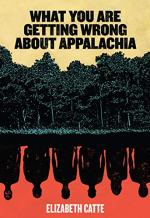
|
| Name: _________________________ | Period: ___________________ |
This test consists of 15 multiple choice questions and 5 short answer questions.
Multiple Choice Questions
1. Catte laments the tradition of "casting Appalachia as what kind of 'other America'" (8)?
(a) Backwards.
(b) Monolithic.
(c) Progressive.
(d) Illogical.
2. What phrase does Catte use to name the nonfiction genre associated with John Saward's essay in Vanity Fair?
(a) The Trump Delusion.
(b) The Land of Trump.
(c) The Trump Oasis.
(d) Trump Country.
3. The "most significant labor uprising in United States history" included around how many African American men and women?
(a) 3,000.
(b) 500.
(c) 200.
(d) 2,000.
4. During the week of battle between the private army and the mine workers, what phrase did the miners and their scouts use to identify their allies?
(a) Sixteen tons.
(b) Workers' rights forever.
(c) Underground resistance.
(d) I come creeping.
5. Catte disparages a Vanity Fair essay in which writer John Saward visits what state in order to "understand Donald Trump" (22)?
(a) Tennessee.
(b) West Virginia.
(c) Mississippi.
(d) Kentucky.
6. In what year did private detectives hired by the owners of the Paint Creek mine terrorize the families of the workers in a particular state?
(a) 1899.
(b) 1912.
(c) 1935.
(d) 1957.
7. Catte states that Appalachians and their culture "are often relegated to" (9) what?
(a) The past.
(b) The South.
(c) The land of pariahs.
(d) The Midwest.
8. Catte insists that people in power use the designation of otherness for Appalachia for what reason?
(a) For research.
(b) For profit.
(c) For posterity.
(d) For entertainment.
9. Catte and her partner moved from one state to another how many months before the 2016 presidential election?
(a) 2.
(b) 6.
(c) 3.
(d) 9.
10. How many objectives does Catte name for her nonfiction work What You Are Getting Wrong About Appalachia?
(a) 3.
(b) 5.
(c) 6.
(d) 2.
11. Catte finds the most fault with which element of Vance's public persona during the book tour for Hillbilly Elegy?
(a) Humility.
(b) Ulterior motives.
(c) Deception.
(d) Self-hatred.
12. Who is reported to be directing the film of Hillbilly Elegy?
(a) Ron Howard.
(b) Steven Spielberg.
(c) Spike Jonze.
(d) Charlie Kaufman.
13. Catte asserts that "The visual archive of Appalachia created in" a particular decade "focused exclusively on the region's" (58) what?
(a) Deprivation.
(b) Ancient history.
(c) Strength.
(d) Toxicity.
14. Catte laments that the memoir Hillbilly Elegy is populated by men who take what action?
(a) Embrace their powerlessness.
(b) Commit acts of violence.
(c) Hate their culture.
(d) Shirk employment.
15. What attitude are the coal companies said to have exhibited toward organized labor unions?
(a) Cunning strategy.
(b) Reluctant tolerance.
(c) Strong hatred.
(d) Violent hysteria.
Short Answer Questions
1. The filmmaker Colin Low is quoted as stating that "A camera is like" (58) what object?
2. What did T.C. Crawford dub Appalachia within his book about the region?
3. Catte characterizes Hillbilly Elegy's portrayal of Appalachians in all but which of the following ways?
4. Catte began cataloguing what two types of documents about the "Appalachia Problem" (8)?
5. Catte asserts that "The visual archive of Appalachia created in" what decade "focused exclusively on" (58) a particular quality of Appalachia?
|
This section contains 462 words (approx. 2 pages at 300 words per page) |

|




